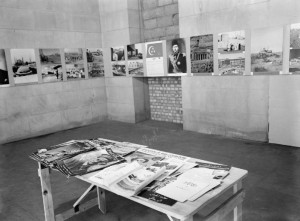 Based at the School of Advanced Study, University of London, Professor Simon Eliot and Dr Henry Irving are leading research into the communications history of the Ministry of Information. Their post reflects on how this research has shaped their contributions to the Being Human festival programme, and of the importance of public engagement with humanities research.
Based at the School of Advanced Study, University of London, Professor Simon Eliot and Dr Henry Irving are leading research into the communications history of the Ministry of Information. Their post reflects on how this research has shaped their contributions to the Being Human festival programme, and of the importance of public engagement with humanities research.
“Why was one of the most recognisable slogans of the Second World War never released?”
The above question was put to us during a recent discussion about the ubiquitous phrase ‘Keep Calm and Carry On’ (a phrase which was coined in the summer of 1939 but not seen in public until 2000).
The answer, “It just wasn’t”, is far from straightforward. As we discovered during research for the history of government blog, the decision was influenced by changes in administrative responsibility, worries about the message, reports of public opinion, and a pressing need for recycled paper in 1940; even the question is complicated by the layers of cultural meaning added since a copy of the poster was ‘rediscovered’.
These are the sort of issues that make the Ministry of Information which operated in Britain during the Second World War such an important example in the history of communication.
The Ministry had been established by the British government to ‘promote the national case to the public at home and abroad in time of war’. This involved an enormous variety of work – with the Ministry producing everything from paperback books and comics to stickers and lapel badges. It also resulted in numerous debates about the tone and purpose of the information being shared.
Our job is less fraught with difficulty. However some of the challenges facing the Ministry are all too familiar.
Communication and understanding
The question of communication is the most obvious. This is a problem which has vexed many working in the humanities. It is also something of a paradox when you consider that our research explores the way human societies are shaped by the material world that surrounds them and their collective cultural reaction to that world (including the humanities and social science, the sciences and technology). Yet still we have often failed to make our voice heard.
We have made an explicit commitment to public engagement within our AHRC-funded project. We are keen to hear from those who remember the Ministry of Information’s work, and are determined that people who have helped to fund our research should benefit from its findings. It is for this reason that we are building a digital archive and museum alongside colleagues at King’s College London. We have also recognised the potential public interest in topics like ‘Keep Calm and Carry On’.
The Being Human festival provides a broader opportunity to recognise the impact that the humanities have on our society. The organisers have made this point explicit. Indeed the festival aims to ‘celebrate the place of the humanities in our lives’ by offering a taste of the rich and varied research being undertaken across the UK. But – just as importantly – it also provides a chance to ask questions about our understanding of ourselves.
Similar matters are at the heart of our research into the Ministry of Information. After all, we are exploring the choices that faced an organisation responsible for ‘promoting the national case’ whilst also exercising a system of overt censorship. Questions about communication and the nature of human society were of paramount importance for those working within such an organisation.
The festival programme
It is with great pleasure that we can now confirm our involvement in the Being Human festival. We hope to provide a unique insight into ‘our understanding of ourselves’ by inviting participants to explore the Ministry of Information’s history inside the very building it occupied for the duration of the Second World War – the University of London’s Senate House.
See a preview of our 15 November festival launch events
An exhibition in Senate House will showcase examples of the Ministry’s work and detail the stories of those who were tasked with using words to maintain morale. A series of talks will provide more details on the history of wartime communication and the Ministry’s use of secret reports to map public opinion. And walking tours will allow visitors to traverse the labyrinthine corridors that once housed its ‘Censorship’, ‘Home Intelligence’ and dreaded ‘Administrative’ divisions.
These events celebrate parts of the Ministry of Information’s rich history of communication. Yet we also hope that they spark discussions about the implications of the subject today. Such discussion is, after all, part of what Being Human is all about.
PHOTO: A Ministry of Information exhibition held at Senate House in 1941 © IWM (D 4075)
The Ministry of Information project is just one of the major research initiatives helping to shape our Being Human programme. For updates on the festival follow us on Twitter @BeingHumanFest, and on Pinterest. Don’t forget to sign up to our e-newsletter, too!
